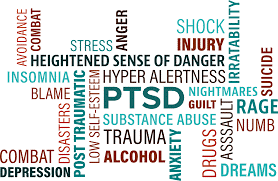What is Complex PTSD?

Post-traumatic stress disorder (PTSD) seems to be becoming more and more recognised as not just something that can only potentially affect those who have fought in a war, but as a mental health condition that affects people who have experienced some kind of trauma. PTSD is an anxiety disorder that is caused by experiencing very stressful, frightening, or distressing events, such as violent personal assaults, serious road accidents, health problems, or experiences during childbirth. Any situation that someone finds traumatic can cause PTSD, which can develop immediately after it or later on. The symptoms of PTSD are often nightmares and flashbacks where a person relives the traumatic event, and experiencing feelings of guilt, irritability, and isolation. Other symptoms may include having difficulty concentrating, or having problems sleeping. Complex PTSD is similar to PTSD but it is often linked to people who have repeatedly experienced traumatic events such as abuse, violence or neglect.
Complex PTSD is quite a new term and while it is similar to PTSD because some of the same symptoms are experienced, it also has other symptoms. These additional symptoms a person experiences include having difficulty in controlling your emotions; having feelings that you are permanently damaged, worthless, completely different to other people, or that nobody can understand what you have been through; feeling extremely distrustful or hostile towards the world, or constantly feeling hopeless or empty; finding relationships and friendships difficult to be in or avoiding them completely; or regularly feeling suicidal. Other symptoms can also include dissociation (losing concentration and attention), exhibiting risky or destructive behaviour, and physical symptoms such as dizziness, headaches and chest or stomach pains.
The traumatic events that may cause Complex PTSD include ongoing domestic violence or abuse; abandonment, or neglect; being a prisoner of war; repeatedly witnessing abuse or violence; experiencing childhood abuse; or being tortured or kidnapped. A person is more likely to develop Complex PTSD if they experienced trauma at an early age, have experienced multiple traumas, the trauma lasted for a long time, someone close to the person is the one who harmed them, or a rescue or an escape from the situation seemed unlikely or impossible. Complex PTSD is also thought to be more severe if the person was alone during the trauma; it was carried out by a parent or a carer; the person experienced it for a long time; they are still in contact with the person responsible for it; or if it happened when they were very young.
Like with lots of mental health conditions, the first step is for a person to talk to their GP about how they are feeling. A GP would carry out an initial assessment on them and can then make a referral to the relevant mental health team. The treatments for Complex PTSD can be the same as those for PTSD, but a person may need more intensive, long-term support to enable their recovery. Treatments for PTSD include Eye Movement Desensitisation and Reprocessing (EMDR) or Trauma-Focused Cognitive Behavioural Therapy (CBT). Because people who have Complex PTSD have difficulty in trusting others, they may be offered more therapy sessions than they normally would be to allow for time to be given to build a trusting relationship between them and their therapist. Treatments for other problems, such as alcohol addiction or depression, can also be given, and ongoing support after the treatment ends should also be offered.
For further information on Complex PTSD and information on where to go for help, please take a look at the references section below. There is also a variety of information available online through various groups and charities.
Sarah Keeping MBPsS MSc PgDip GDip BA (Hons) Cert HE
Follow Sarah on twitter at @keepingapproach, facebook at @keepingapproach, and on instagram at @thekeepingapproach
Follow E-therapy on social media:
Facebook – @Etherapy
Instagram – @EtherapyToday
Twitter – @EtherapyToday
References
https://www.nhs.uk/conditions/post-traumatic-stress-disorder-ptsd/
https://www.nhs.uk/conditions/post-traumatic-stress-disorder-ptsd/complex/



